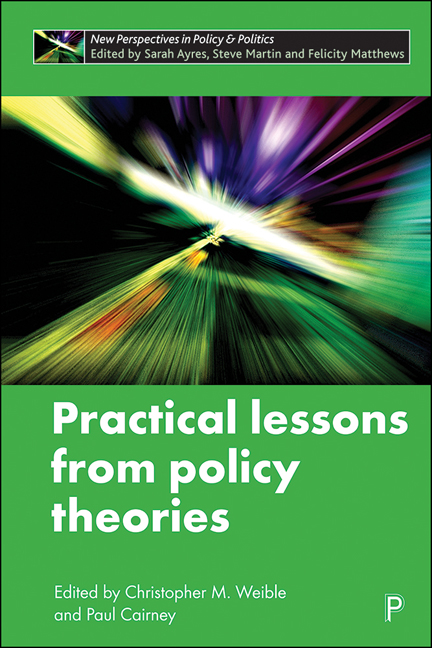Book contents
- Frontmatter
- Contents
- List of figures and tables
- Notes on contributors
- one Purposes and paths in drawing practical lessons from policy theories
- two Three habits of successful policy entrepreneurs
- three Narratives as tools for influencing policy change
- four Using cultural theory to navigate the policy process
- five The lessons of policy learning: types, triggers, hindrances and pathologies
- six Practical prescriptions for governing fragmented governments
- seven Drawing practical lessons from punctuated equilibrium theory
- eight Policy design and the added-value of the institutional analysis development framework
- nine Why advocacy coalitions matter and practical insights about them
- ten Reflections and resolutions in drawing practical lessons from policy theories
- Index
one - Purposes and paths in drawing practical lessons from policy theories
Published online by Cambridge University Press: 05 January 2022
- Frontmatter
- Contents
- List of figures and tables
- Notes on contributors
- one Purposes and paths in drawing practical lessons from policy theories
- two Three habits of successful policy entrepreneurs
- three Narratives as tools for influencing policy change
- four Using cultural theory to navigate the policy process
- five The lessons of policy learning: types, triggers, hindrances and pathologies
- six Practical prescriptions for governing fragmented governments
- seven Drawing practical lessons from punctuated equilibrium theory
- eight Policy design and the added-value of the institutional analysis development framework
- nine Why advocacy coalitions matter and practical insights about them
- ten Reflections and resolutions in drawing practical lessons from policy theories
- Index
Summary
Introduction
We challenge policy theory scholars to change the way we produce and communicate research: translate our findings to a wider audience to gauge the clarity and quality of our findings. Policy theories have generated widespread knowledge of the policy process, but the field is vast and uncoordinated, and too many scholars hide behind a veil of jargon and obfuscation. Some of the most visible outcomes – such as limited relevance to practitioners, and anxiety and confusion among students or early career researchers with a limited grasp of a complex field – reflects a less visible but more worrying academic problem: we often assume, rather than demonstrate, that policy process research contains insights that add cumulative and comparable knowledge to the field.
Yet, if we do not take the time to check if we understand the state of the art, and can share a common understanding with our peers, how can we state that we are accumulating knowledge collectively rather than producing work of limited relevance beyond our own narrow individual concerns? Is there genuinely a cohesive, advancing, field of policy theories or are we each producing our own theories and assuming they are useful to others? We need to ask these searching questions more often and place them front and centre of academic debate.
Some thematic reviews already try to compare insights across many theories (Heikkila and Cairney, 2017) but they only scratch the surface and provide limited assurance about a coherent policy process research agenda. We need more work from theory-specific experts to explain their theories and empirical knowledge clearly enough to help others gauge progress and compare it to progress among other approaches. To add clarity and communication across the entire field of public policy theory, we need theoretical specialists to explain state of the art knowledge to their peers. To do so, we should explore better ways to communicate its lexicon. If we succeed, we can proceed with confidence. If not, we should ask ourselves uncomfortable questions about the state of our field or, at least, key approaches.
In this new context, a process of ‘translation’ no longer has a single purpose, to describe the value of scholarship to a wider audience (Flinders, 2013). Rather, a fundamentally important additional purpose, and the focus of the book, is to help policy scholars communicate clearly with each other to improve their knowledge and insights.
- Type
- Chapter
- Information
- Practical Lessons from Policy Theories , pp. 1 - 12Publisher: Bristol University PressPrint publication year: 2021



